
Avalon-LLM
This repository contains a LLM benchmark for the social deduction game `Resistance Avalon'
Stars: 69
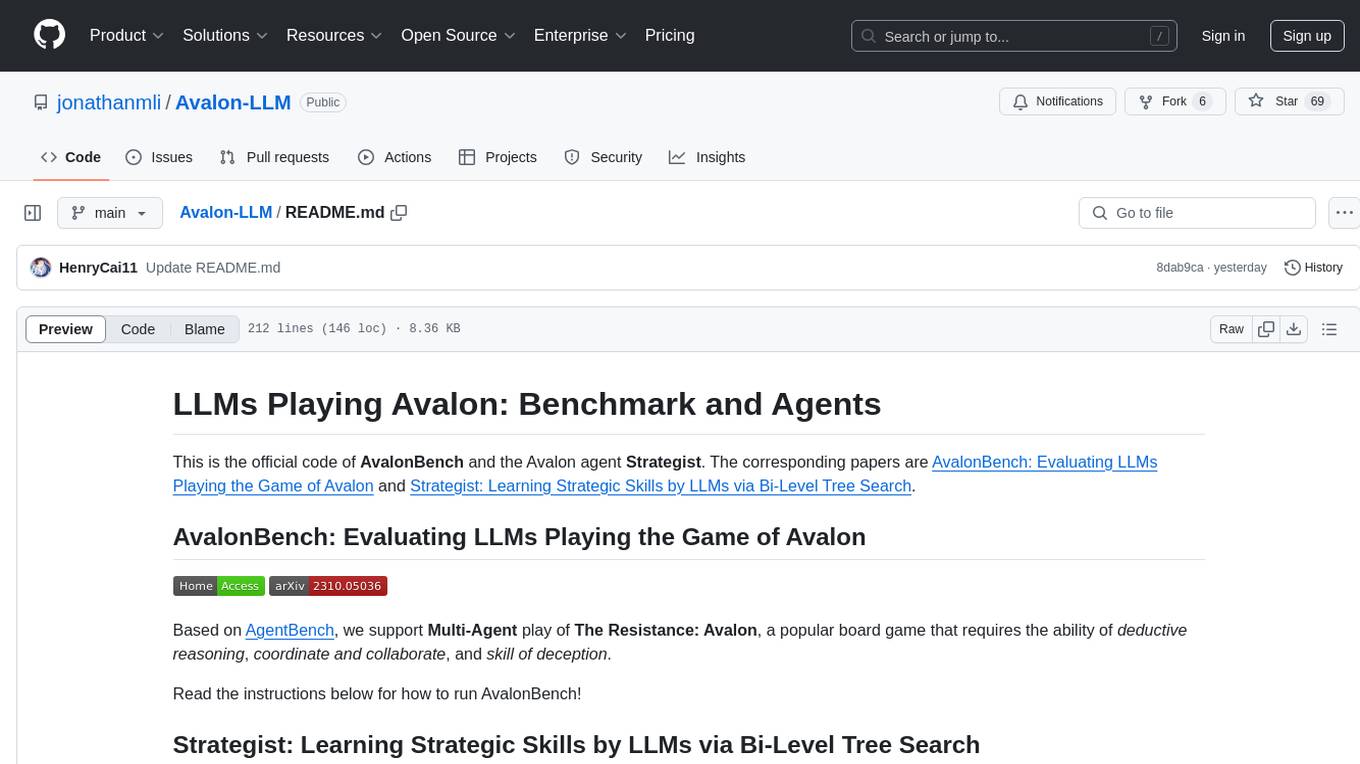
Avalon-LLM is a repository containing the official code for AvalonBench and the Avalon agent Strategist. AvalonBench evaluates Large Language Models (LLMs) playing The Resistance: Avalon, a board game requiring deductive reasoning, coordination, collaboration, and deception skills. Strategist utilizes LLMs to learn strategic skills through self-improvement, including high-level strategic evaluation and low-level execution guidance. The repository provides instructions for running AvalonBench, setting up Strategist, and conducting experiments with different agents in the game environment.
README:
This is the official code of AvalonBench and the Avalon agent Strategist. The corresponding papers are AvalonBench: Evaluating LLMs Playing the Game of Avalon and Strategist: Learning Strategic Skills by LLMs via Bi-Level Tree Search.
Based on AgentBench, we support Multi-Agent play of The Resistance: Avalon, a popular board game that requires the ability of deductive reasoning, coordinate and collaborate, and skill of deception.
Read the instructions below for how to run AvalonBench!
In this work, we propose Strategist, which utilizes LLMs to acquire new skills for playing multi-agent games through a self-improvement process. Our method gathers quality feedback through self-play simulations with Monte Carlo tree search and LLM-based reflection, which can then be used to learn high-level strategic skills such as how to evaluate states that guide the low-level execution.
You can learn how to play with Strategist on AvalonBench at here, and the code/usage for bi-level tree search of Strategist can be found at the strategist folder.
- [2024/08] 🔥Try out our new agent, Strategist, by using the
avalon-dev-single-discussconfig, and find more details at Strategist: Learning Strategic Skills by LLMs via Bi-Level Tree Search! - [2024/07] Our new agent
SearchlightLLMAgentWithDiscussionis available atsrc/server/tasks/avalon/agents/search_agent.py. The academic paper will be coming soon. - [2023/11] 🎶Multi-LLM setting with AgentBench v0.2 is ready to roll! Details of the multi-agent submodule can be found here
- [2023/11]
♠️ We've added a new game called GOPS (Game of Pure Strategy [Wiki]). For more details of the code, please refer to here. - [2023/10] 🤖We've updated our code based on AgentBench v0.2. For the older version, please visit here.
GPT-3.5-turbo🤖 playing against rule-based bots in AvalonBench
https://github.com/jonathanmli/Avalon-LLM/assets/24936331/e15eadc0-60e6-448d-88a0-854ba35d628c
GPT-4-turbo🤖 playing against rule-based bots in AvalonBench
https://github.com/jonathanmli/Avalon-LLM/assets/24936331/23fcb204-7570-4449-8777-b179c25251ad
GPT-3.5-turbos🤖 playing against each other
https://github.com/jonathanmli/Avalon-LLM/assets/24936331/9257d081-67ff-43d4-bbcf-b20415b32595
Here are the results of LLMs playing against baseline bots.
We also let LLMs playing against each other. Evil has an 8:2 advantage over Good, which is similar to the stats of rookie human players! Here are also some examples of discussion under this setting.
Install the dependencies.
conda create -n avalonbench python=3.9
conda activate avalonbench
pip install -r requirements.txtYou need to fill your OPENAI API KEY in configs/agents/openai-chat first. Please replace <OPENAI_API_KEY> in Bearer <OPENAI_API_KEY> with your key.
Start the game (3 is the number of workers)
python -m src.start_task -a --start avalon-dev-single 3Open a new terminal and start the assigner
python -m src.assigner --config ./configs/assignments/test_avalon.yaml- You can modify the file
configs/tasks/avalon.yamlto configure the agent list. A config file looks like this:
default:
module: "src.server.tasks.avalon.AvalonBench"
parameters:
num_players: 5
discussion: False
avalon-dev-naive:
parameters:
name: "AvalonBench-dev-naive"
data_file: "data/avalon/dev.json"
agent_list: ["naive", "naive", "naive", "naive", "naive"]
avalon-dev-single:
parameters:
name: "AvalonBench-dev-single"
data_file: "data/avalon/dev.json"
agent_list: ["llm", "naive", "naive", "naive", "naive"]where naive stands for the naive bots. Agents will play the roles with the same index in the data file (see following).
Note: There should only be one "llm" in the `agent_list`
- You can also add data in
data/avalon/dev.json(Note: Currently we only support the 5-player game setting, which includes 1 Merlin, 2 Servants, 1 Minion and 1 Assassin). A data item looks like this:
{
"num_players": 5,
"quest_leader": 0,
"role_names": ["Assassin", "Servant", "Servant", "Merlin", "Minion"]
}where quest_leader is the id of the initial quest leader in this game. You can change the game setup by altering quest_leader with number from 0 to 4, and by permuting role_names.
You can also start a naive experiment using:
python -m src.start_task -a --start avalon-dev-naive 3where all the agents are naive bots. For details of the naive strategies, please refer to the paper.
You can also start a Multi-LLM experiment using:
python -m src.start_task -a --start avalon-dev-multi 3where all the agents will be Large Language Models.
Our agent, Strategist, is also available in this repo. You can start the experiment using:
# Strategist playing against naive baselines
python -m src.start_task -a --start avalon-dev-single-search 1All the prompts are maintained in src/server/tasks/avalon/prompt.py. You can find the respective prompts used in src/server/tasks/avalon/agents/llm_with_discussion.py and src/server/tasks/avalon/wrapper.py.
We also provide our engines along with examples of usage for developers in avalonbench_dev.
You can import and use the game engine by running
from engine import AvalonGameEnvironment, AvalonConfigFirst input your game configurations into AvalonBasicConfig, then create an AvalonGameEnvironment based on that.
For an example of how to use the game engine, see avalonbench_dev/avalon/test_engine.py
@inproceedings{
light2023from,
title={AvalonBench: Evaluating {LLM}s Playing the Game of Avalon},
author={Jonathan Light and Min Cai and Sheng Shen and Ziniu Hu},
booktitle={NeurIPS 2023 Foundation Models for Decision Making Workshop},
year={2023},
url={https://openreview.net/forum?id=ltUrSryS0K}
}
For Tasks:
Click tags to check more tools for each tasksFor Jobs:
Alternative AI tools for Avalon-LLM
Similar Open Source Tools

Avalon-LLM
Avalon-LLM is a repository containing the official code for AvalonBench and the Avalon agent Strategist. AvalonBench evaluates Large Language Models (LLMs) playing The Resistance: Avalon, a board game requiring deductive reasoning, coordination, collaboration, and deception skills. Strategist utilizes LLMs to learn strategic skills through self-improvement, including high-level strategic evaluation and low-level execution guidance. The repository provides instructions for running AvalonBench, setting up Strategist, and conducting experiments with different agents in the game environment.
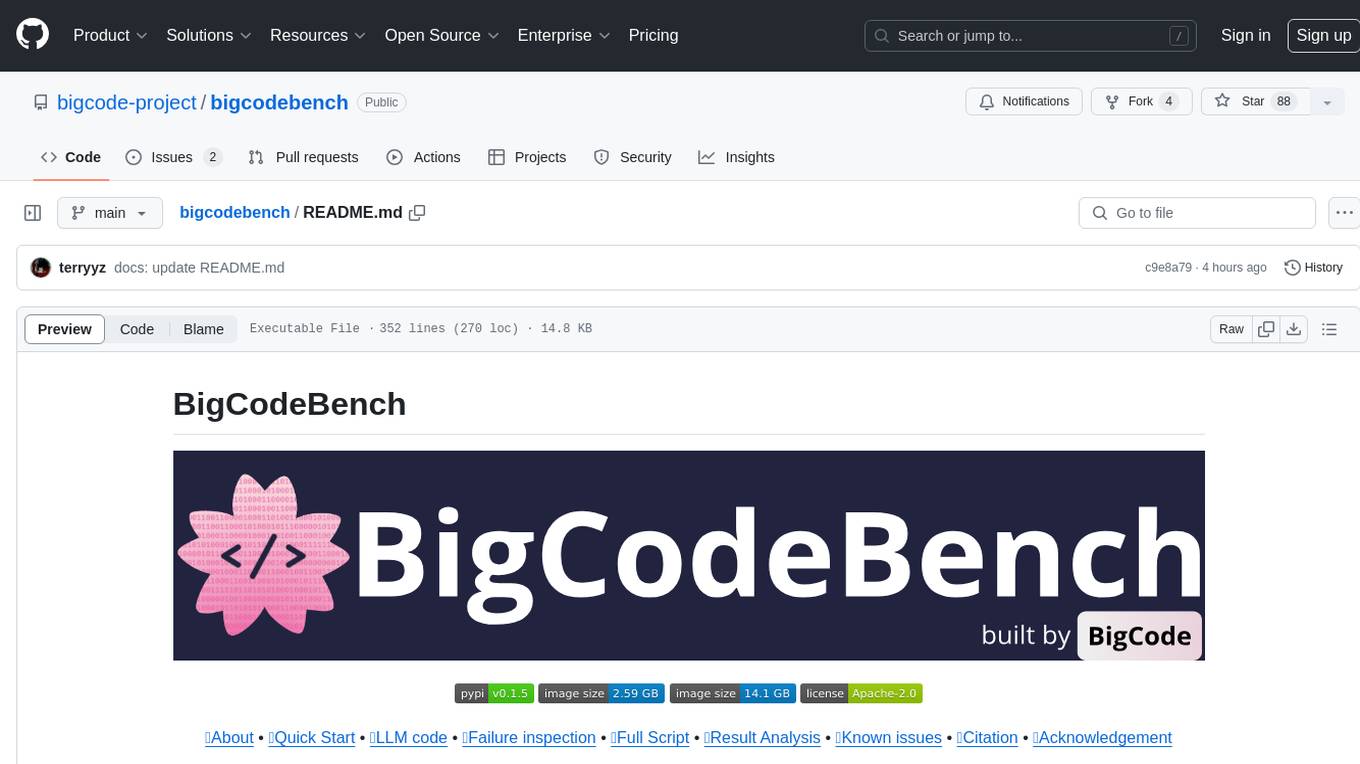
bigcodebench
BigCodeBench is an easy-to-use benchmark for code generation with practical and challenging programming tasks. It aims to evaluate the true programming capabilities of large language models (LLMs) in a more realistic setting. The benchmark is designed for HumanEval-like function-level code generation tasks, but with much more complex instructions and diverse function calls. BigCodeBench focuses on the evaluation of LLM4Code with diverse function calls and complex instructions, providing precise evaluation & ranking and pre-generated samples to accelerate code intelligence research. It inherits the design of the EvalPlus framework but differs in terms of execution environment and test evaluation.
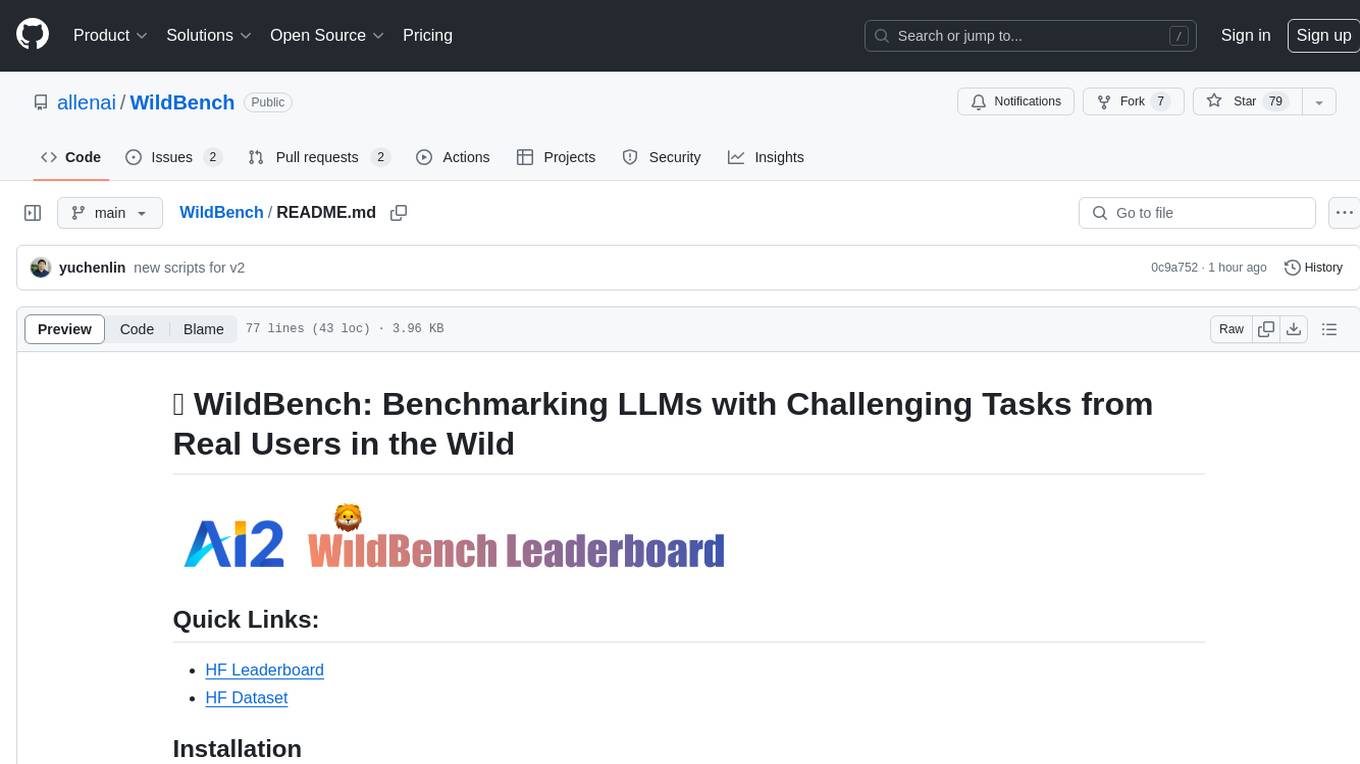
WildBench
WildBench is a tool designed for benchmarking Large Language Models (LLMs) with challenging tasks sourced from real users in the wild. It provides a platform for evaluating the performance of various models on a range of tasks. Users can easily add new models to the benchmark by following the provided guidelines. The tool supports models from Hugging Face and other APIs, allowing for comprehensive evaluation and comparison. WildBench facilitates running inference and evaluation scripts, enabling users to contribute to the benchmark and collaborate on improving model performance.

MetaGPT
MetaGPT is a multi-agent framework that enables GPT to work in a software company, collaborating to tackle more complex tasks. It assigns different roles to GPTs to form a collaborative entity for complex tasks. MetaGPT takes a one-line requirement as input and outputs user stories, competitive analysis, requirements, data structures, APIs, documents, etc. Internally, MetaGPT includes product managers, architects, project managers, and engineers. It provides the entire process of a software company along with carefully orchestrated SOPs. MetaGPT's core philosophy is "Code = SOP(Team)", materializing SOP and applying it to teams composed of LLMs.
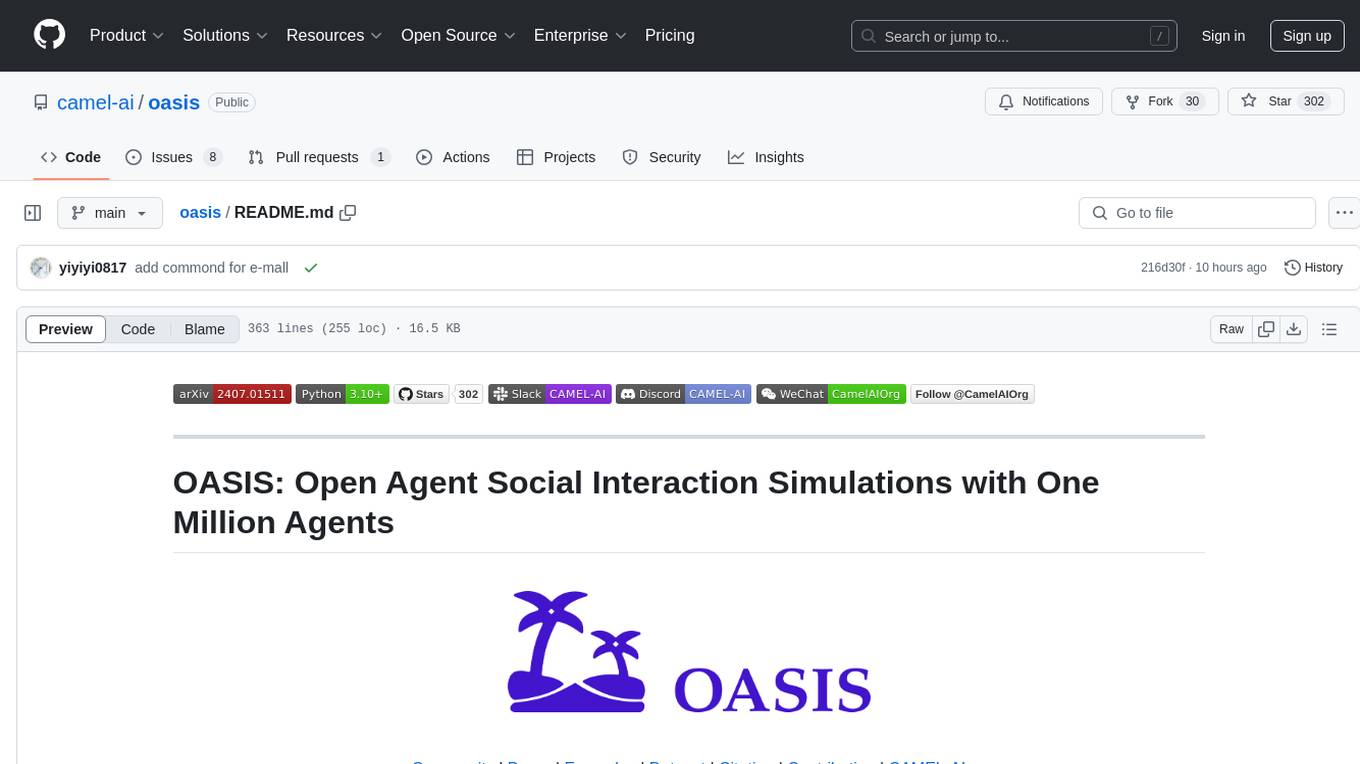
oasis
OASIS is a scalable, open-source social media simulator that integrates large language models with rule-based agents to realistically mimic the behavior of up to one million users on platforms like Twitter and Reddit. It facilitates the study of complex social phenomena such as information spread, group polarization, and herd behavior, offering a versatile tool for exploring diverse social dynamics and user interactions in digital environments. With features like scalability, dynamic environments, diverse action spaces, and integrated recommendation systems, OASIS provides a comprehensive platform for simulating social media interactions at a large scale.
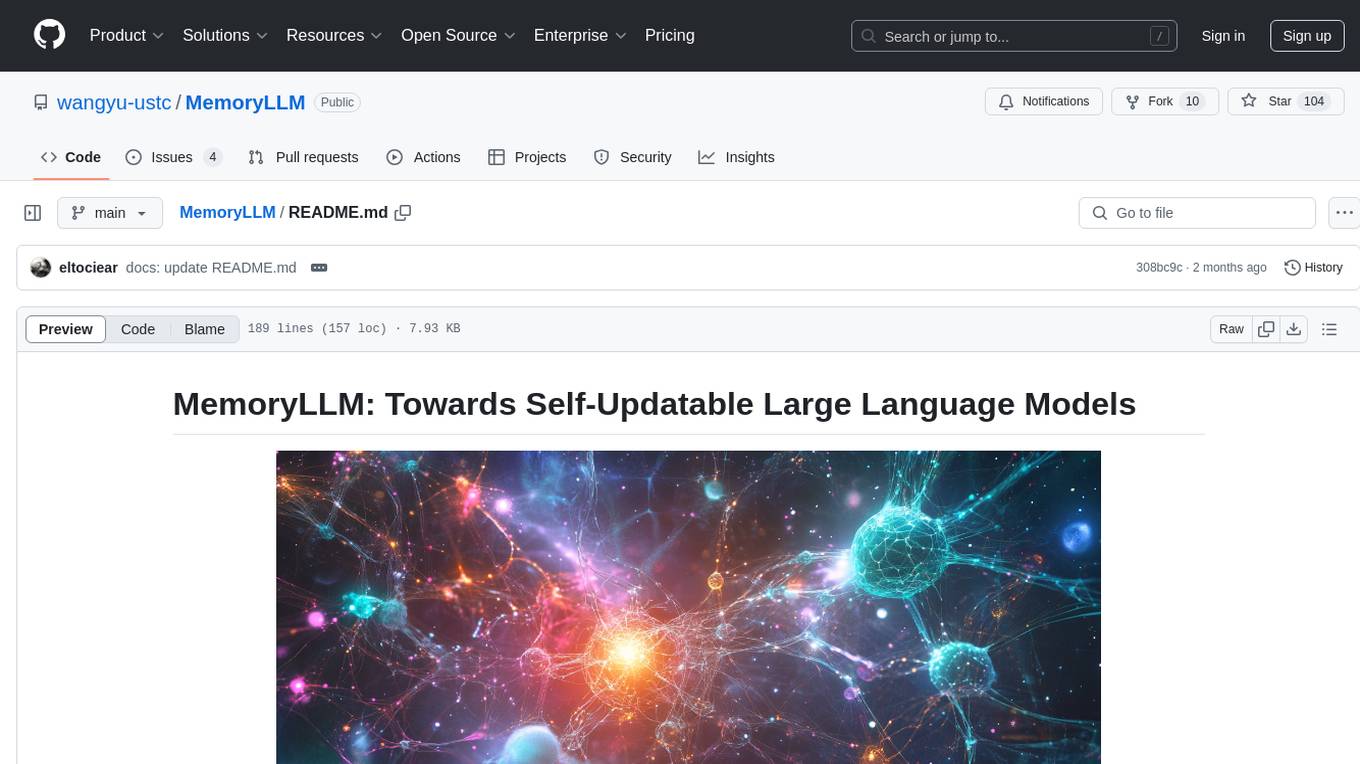
MemoryLLM
MemoryLLM is a large language model designed for self-updating capabilities. It offers pretrained models with different memory capacities and features, such as chat models. The repository provides training code, evaluation scripts, and datasets for custom experiments. MemoryLLM aims to enhance knowledge retention and performance on various natural language processing tasks.
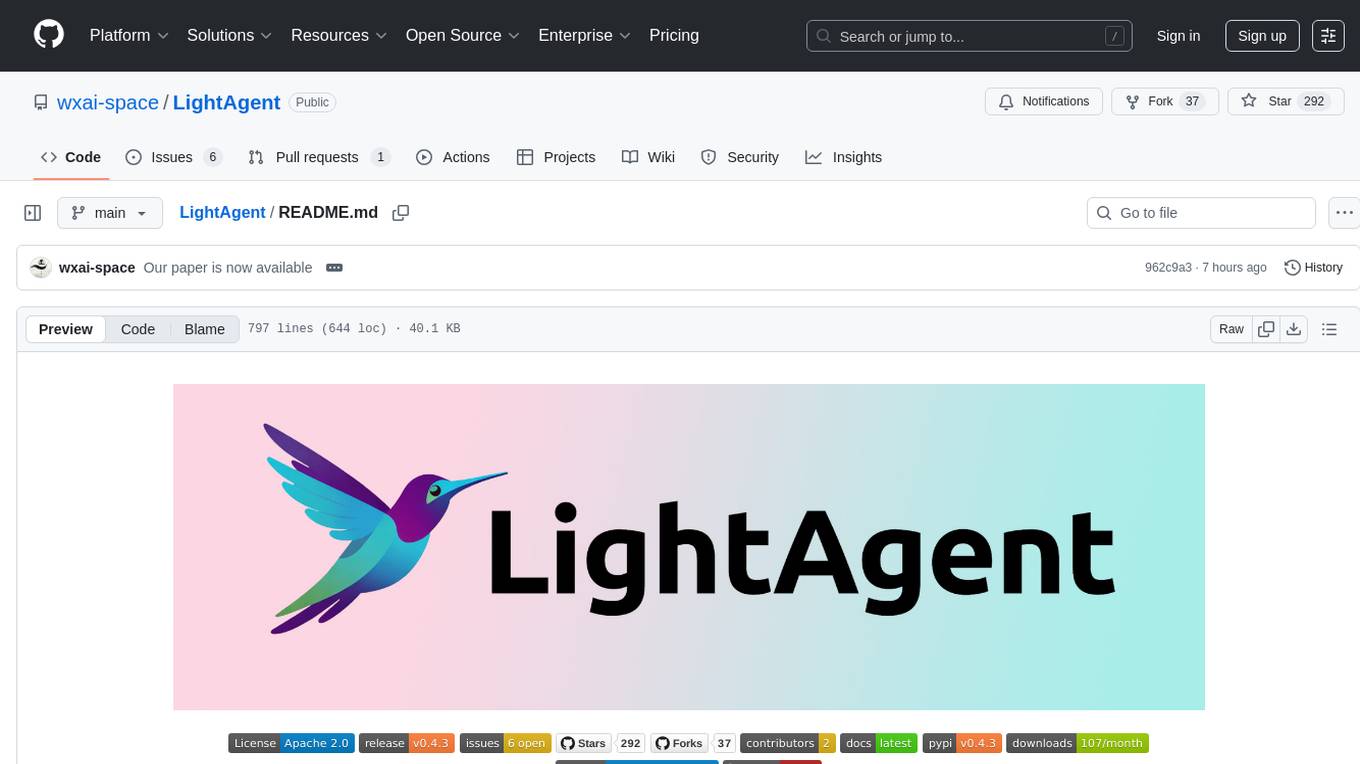
LightAgent
LightAgent is a lightweight, open-source Agentic AI development framework with memory, tools, and a tree of thought. It supports multi-agent collaboration, autonomous learning, tool integration, complex task handling, and multi-model support. It also features a streaming API, tool generator, agent self-learning, adaptive tool mechanism, and more. LightAgent is designed for intelligent customer service, data analysis, automated tools, and educational assistance.
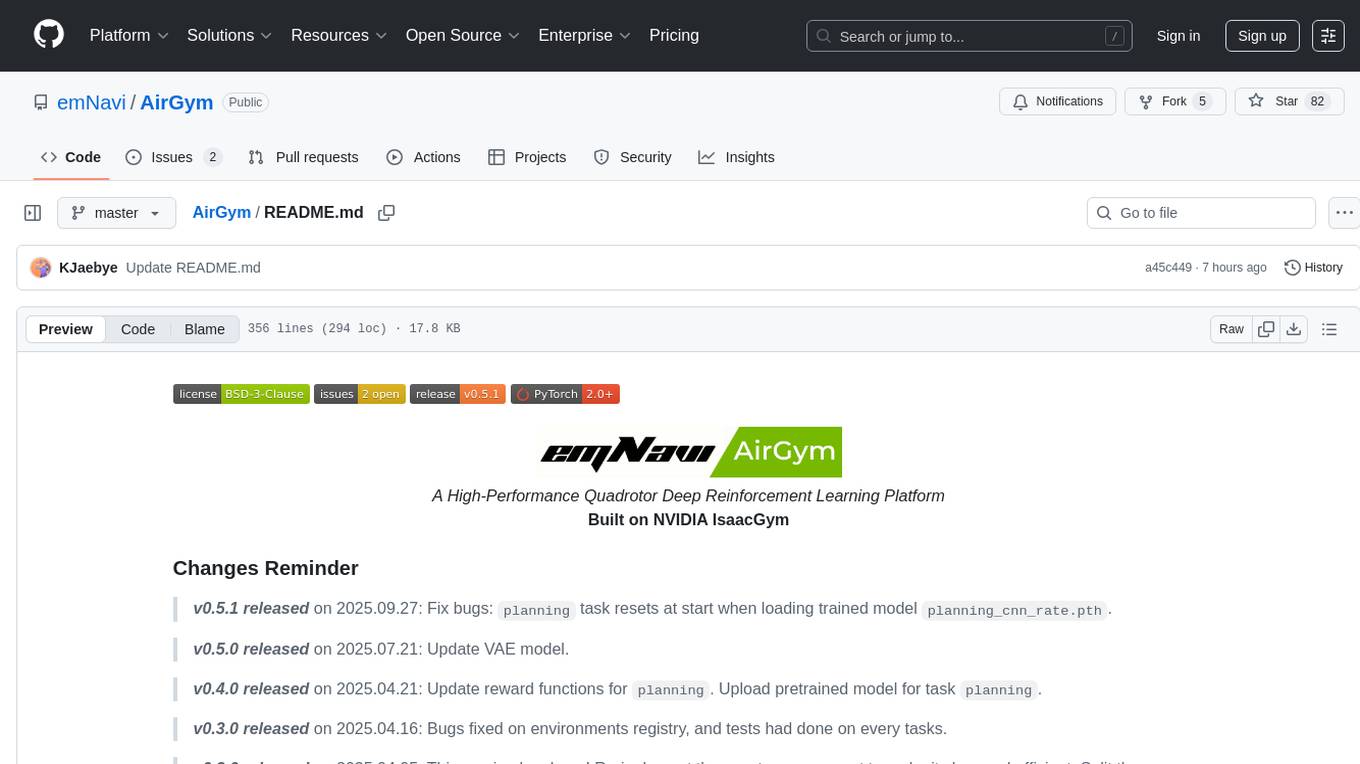
AirGym
AirGym is an open source Python quadrotor simulator based on IsaacGym, providing a high-fidelity dynamics and Deep Reinforcement Learning (DRL) framework for quadrotor robot learning research. It offers a lightweight and customizable platform with strict alignment with PX4 logic, multiple control modes, and Sim-to-Real toolkits. Users can perform tasks such as Hovering, Balloon, Tracking, Avoid, and Planning, with the ability to create customized environments and tasks. The tool also supports training from scratch, visual encoding approaches, playing and testing of trained models, and customization of new tasks and assets.
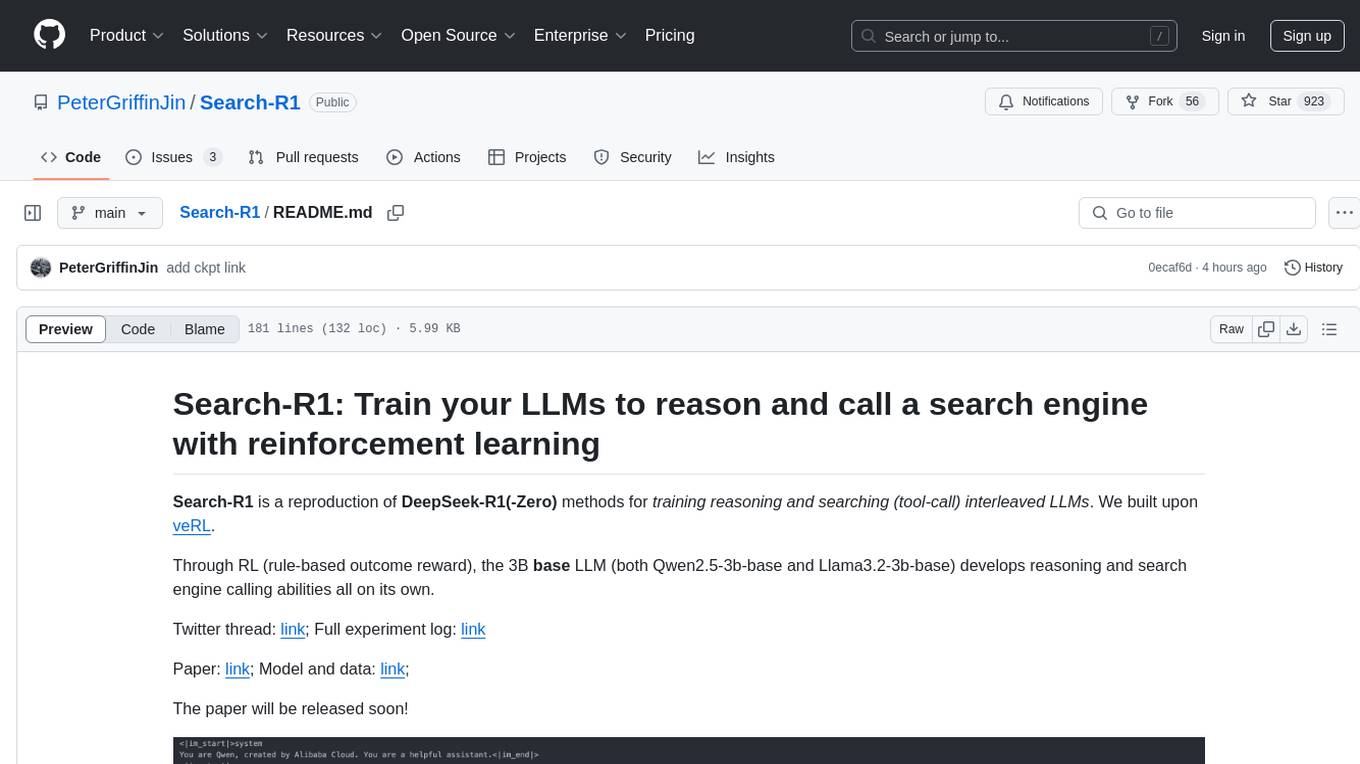
Search-R1
Search-R1 is a tool that trains large language models (LLMs) to reason and call a search engine using reinforcement learning. It is a reproduction of DeepSeek-R1 methods for training reasoning and searching interleaved LLMs, built upon veRL. Through rule-based outcome reward, the base LLM develops reasoning and search engine calling abilities independently. Users can train LLMs on their own datasets and search engines, with preliminary results showing improved performance in search engine calling and reasoning tasks.
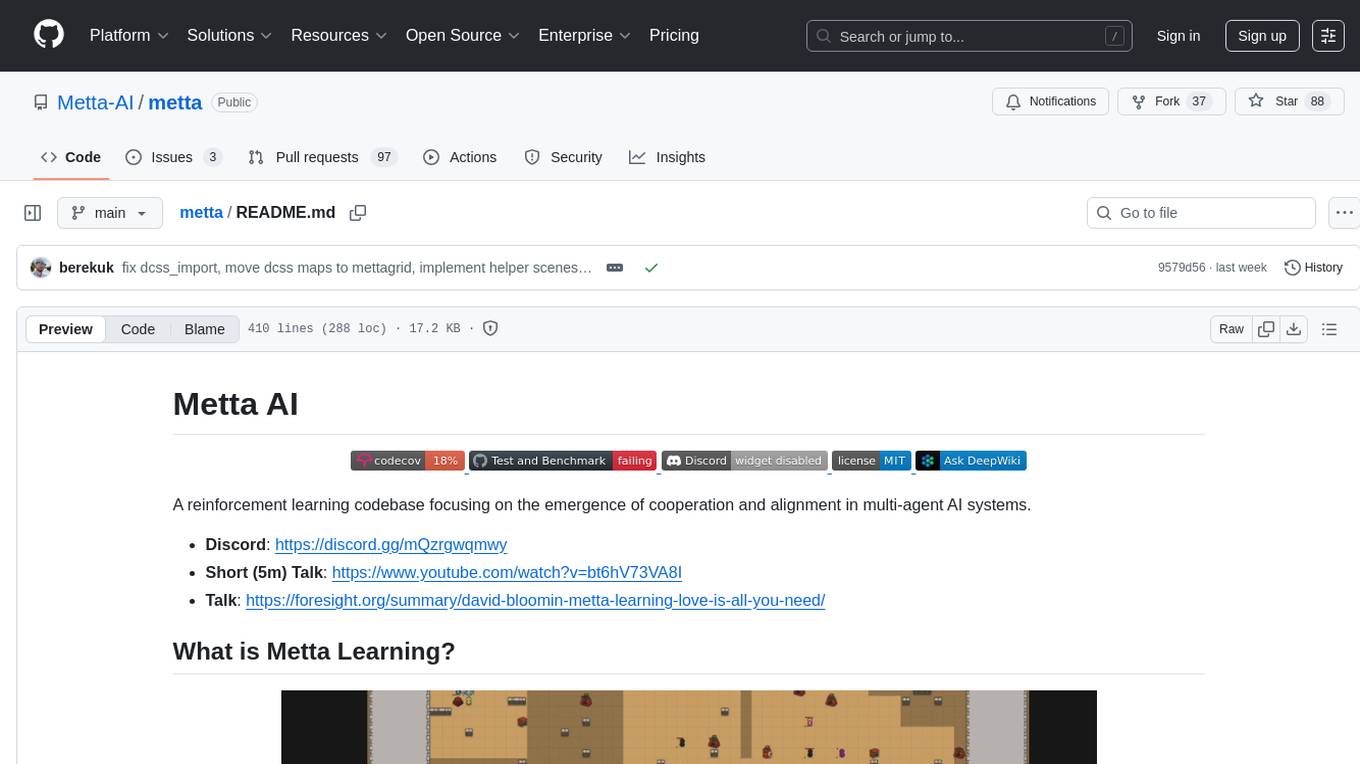
metta
Metta AI is an open-source research project focusing on the emergence of cooperation and alignment in multi-agent AI systems. It explores the impact of social dynamics like kinship and mate selection on learning and cooperative behaviors of AI agents. The project introduces a reward-sharing mechanism mimicking familial bonds and mate selection to observe the evolution of complex social behaviors among AI agents. Metta aims to contribute to the discussion on safe and beneficial AGI by creating an environment where AI agents can develop general intelligence through continuous learning and adaptation.
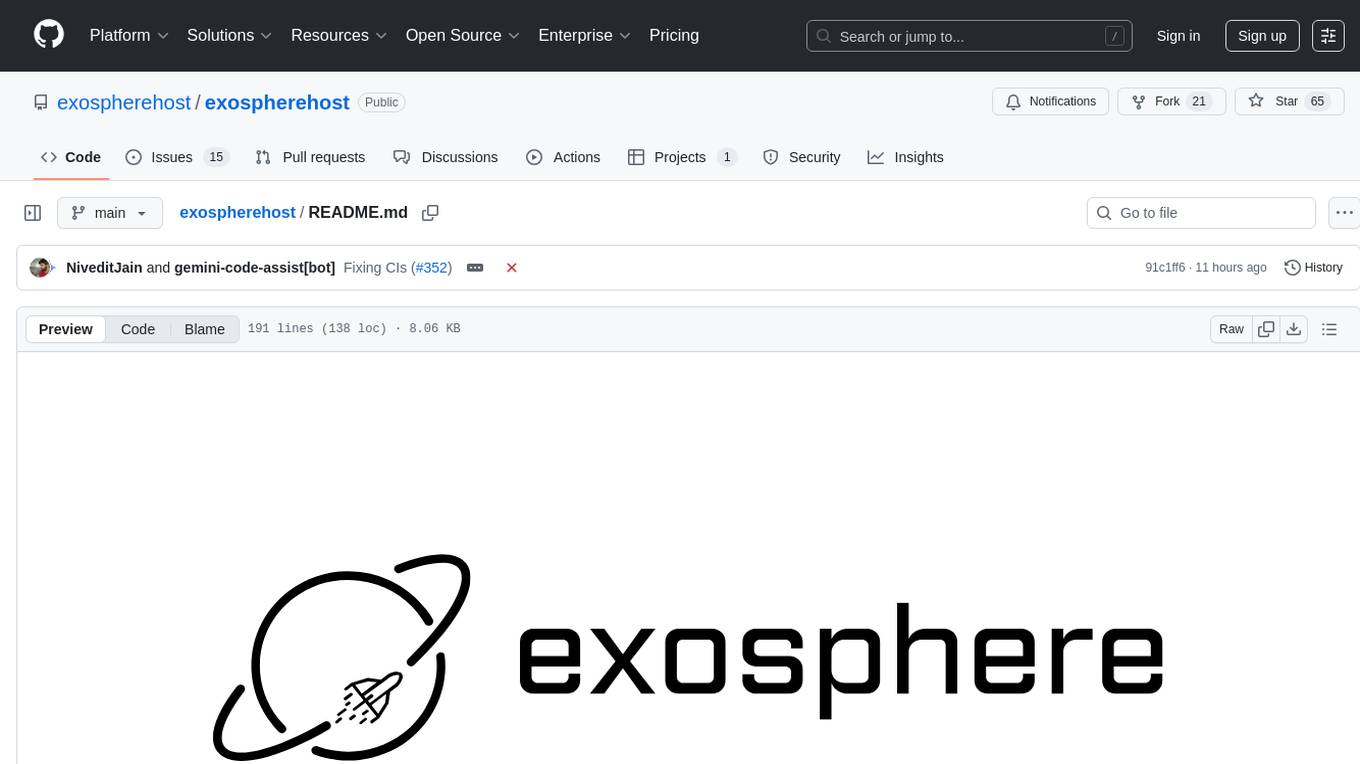
exospherehost
Exosphere is an open source infrastructure designed to run AI agents at scale for large data and long running flows. It allows developers to define plug and playable nodes that can be run on a reliable backbone in the form of a workflow, with features like dynamic state creation at runtime, infinite parallel agents, persistent state management, and failure handling. This enables the deployment of production agents that can scale beautifully to build robust autonomous AI workflows.
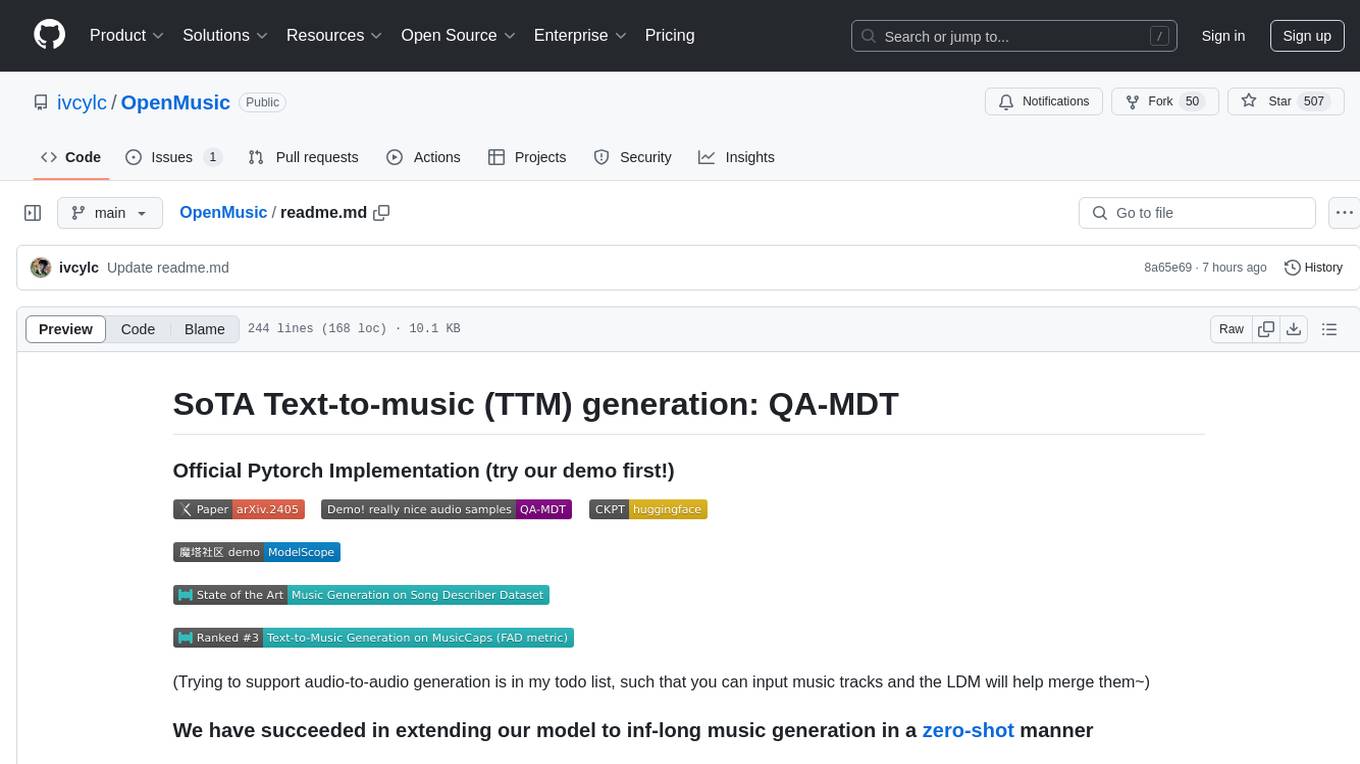
OpenMusic
OpenMusic is a repository providing an implementation of QA-MDT, a Quality-Aware Masked Diffusion Transformer for music generation. The code integrates state-of-the-art models and offers training strategies for music generation. The repository includes implementations of AudioLDM, PixArt-alpha, MDT, AudioMAE, and Open-Sora. Users can train or fine-tune the model using different strategies and datasets. The model is well-pretrained and can be used for music generation tasks. The repository also includes instructions for preparing datasets, training the model, and performing inference. Contact information is provided for any questions or suggestions regarding the project.
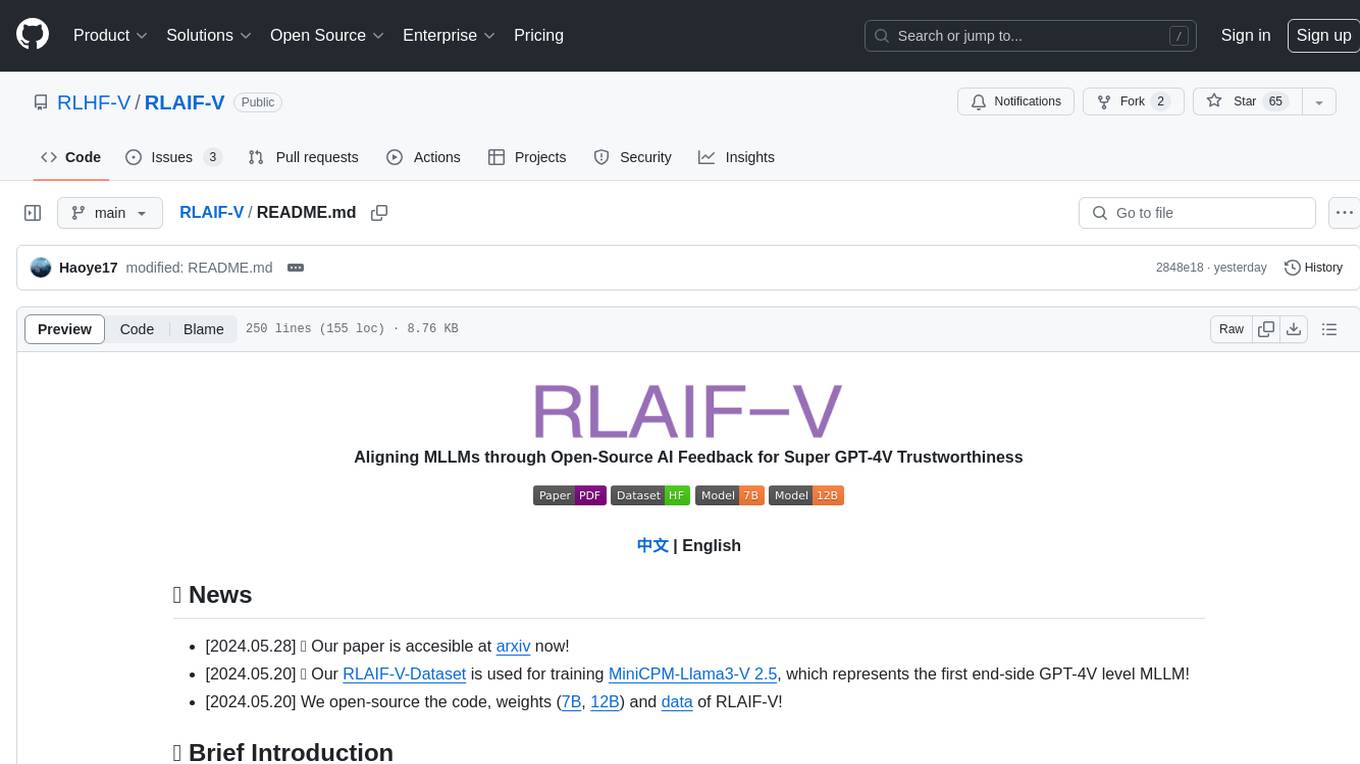
RLAIF-V
RLAIF-V is a novel framework that aligns MLLMs in a fully open-source paradigm for super GPT-4V trustworthiness. It maximally exploits open-source feedback from high-quality feedback data and online feedback learning algorithm. Notable features include achieving super GPT-4V trustworthiness in both generative and discriminative tasks, using high-quality generalizable feedback data to reduce hallucination of different MLLMs, and exhibiting better learning efficiency and higher performance through iterative alignment.
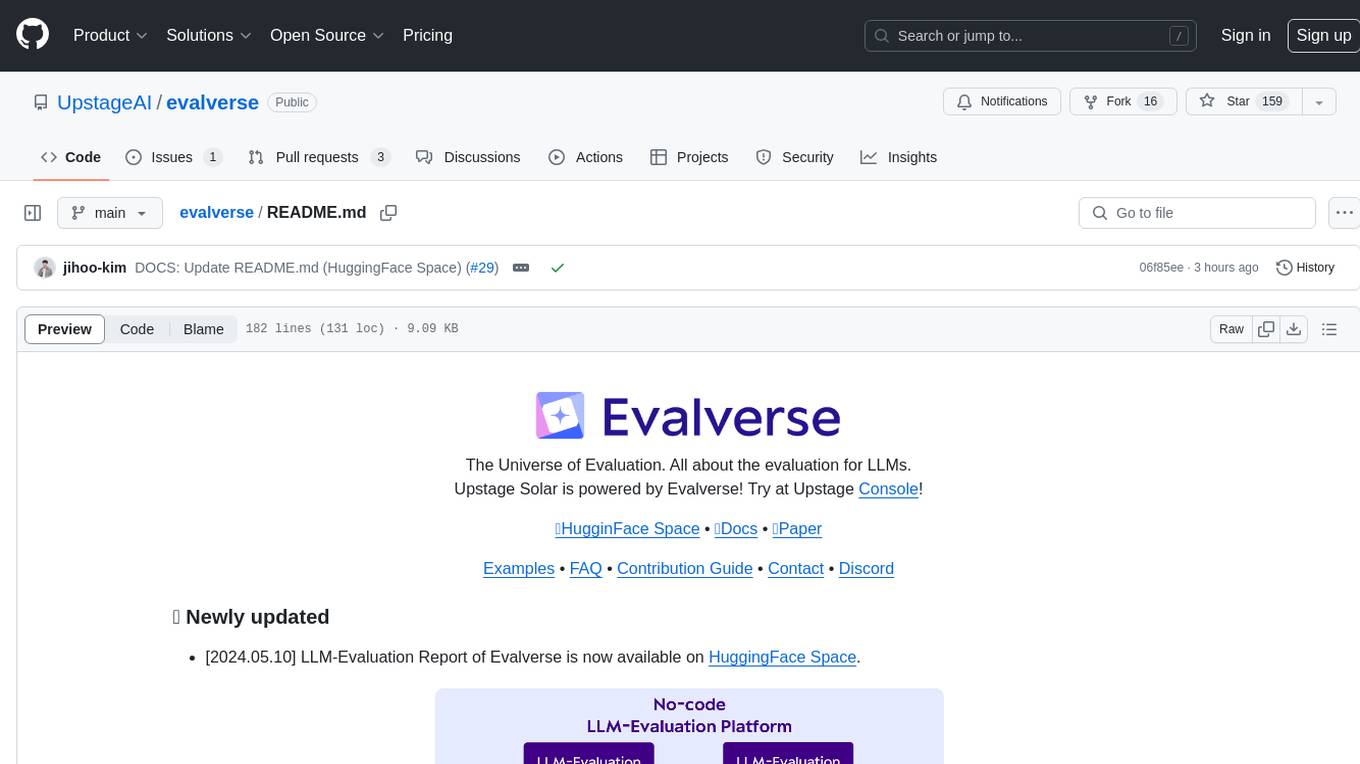
evalverse
Evalverse is an open-source project designed to support Large Language Model (LLM) evaluation needs. It provides a standardized and user-friendly solution for processing and managing LLM evaluations, catering to AI research engineers and scientists. Evalverse supports various evaluation methods, insightful reports, and no-code evaluation processes. Users can access unified evaluation with submodules, request evaluations without code via Slack bot, and obtain comprehensive reports with scores, rankings, and visuals. The tool allows for easy comparison of scores across different models and swift addition of new evaluation tools.
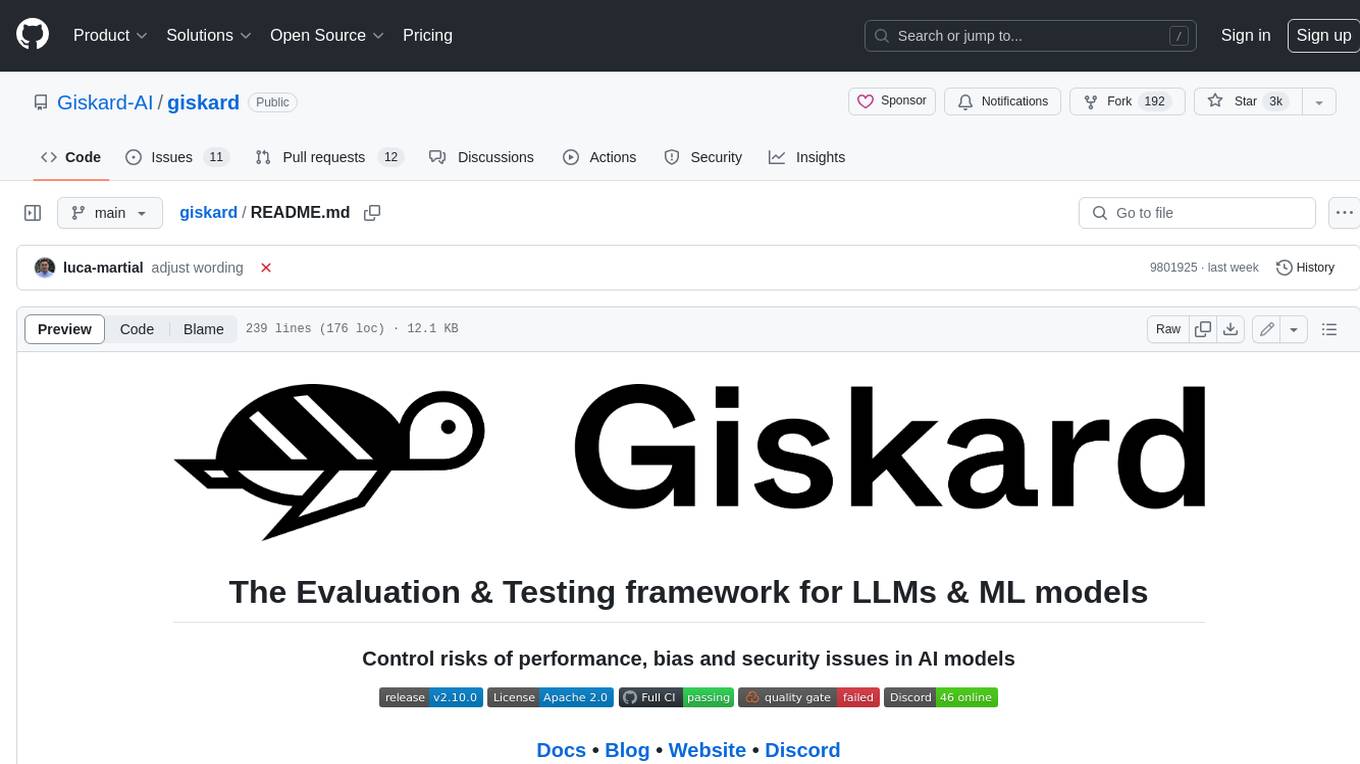
giskard
Giskard is an open-source Python library that automatically detects performance, bias & security issues in AI applications. The library covers LLM-based applications such as RAG agents, all the way to traditional ML models for tabular data.
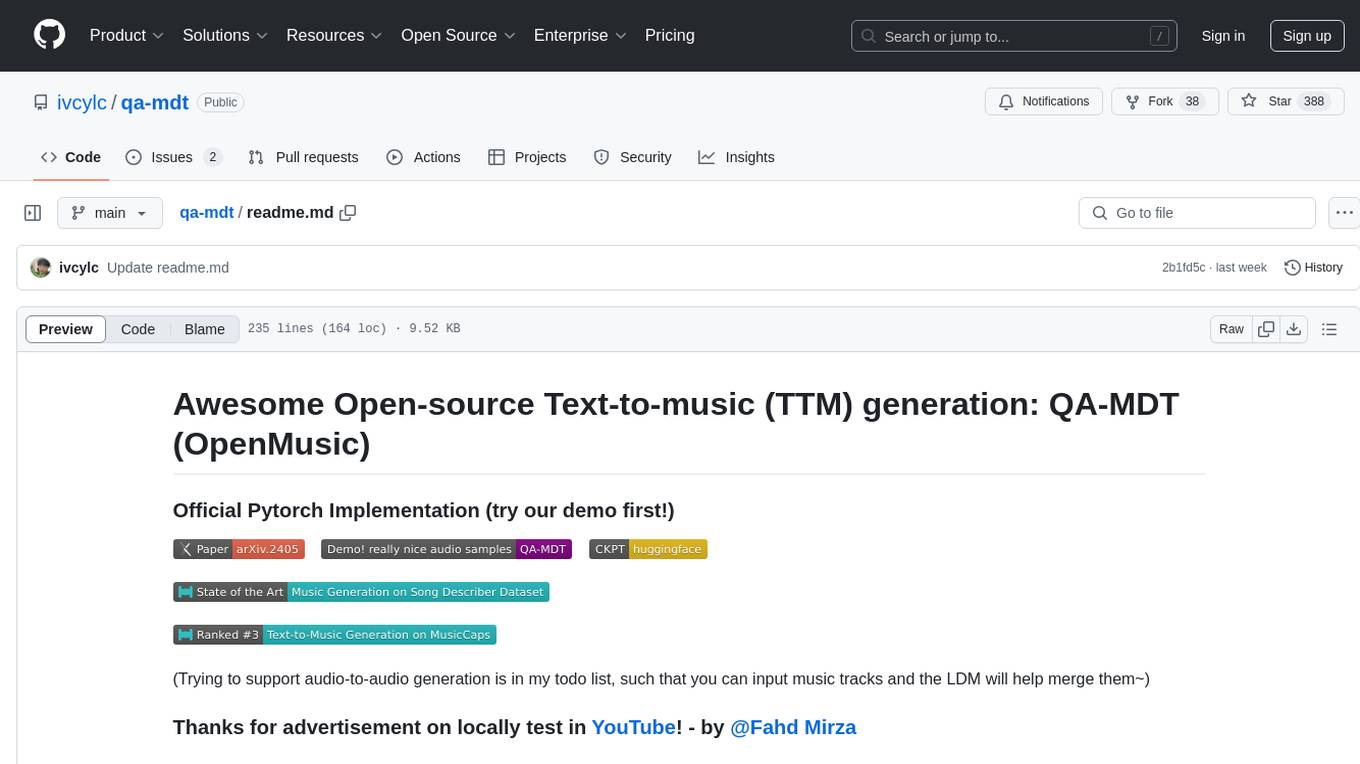
qa-mdt
This repository provides an implementation of QA-MDT, integrating state-of-the-art models for music generation. It offers a Quality-Aware Masked Diffusion Transformer for enhanced music generation. The code is based on various repositories like AudioLDM, PixArt-alpha, MDT, AudioMAE, and Open-Sora. The implementation allows for training and fine-tuning the model with different strategies and datasets. The repository also includes instructions for preparing datasets in LMDB format and provides a script for creating a toy LMDB dataset. The model can be used for music generation tasks, with a focus on quality injection to enhance the musicality of generated music.
For similar tasks

Avalon-LLM
Avalon-LLM is a repository containing the official code for AvalonBench and the Avalon agent Strategist. AvalonBench evaluates Large Language Models (LLMs) playing The Resistance: Avalon, a board game requiring deductive reasoning, coordination, collaboration, and deception skills. Strategist utilizes LLMs to learn strategic skills through self-improvement, including high-level strategic evaluation and low-level execution guidance. The repository provides instructions for running AvalonBench, setting up Strategist, and conducting experiments with different agents in the game environment.
For similar jobs

weave
Weave is a toolkit for developing Generative AI applications, built by Weights & Biases. With Weave, you can log and debug language model inputs, outputs, and traces; build rigorous, apples-to-apples evaluations for language model use cases; and organize all the information generated across the LLM workflow, from experimentation to evaluations to production. Weave aims to bring rigor, best-practices, and composability to the inherently experimental process of developing Generative AI software, without introducing cognitive overhead.

LLMStack
LLMStack is a no-code platform for building generative AI agents, workflows, and chatbots. It allows users to connect their own data, internal tools, and GPT-powered models without any coding experience. LLMStack can be deployed to the cloud or on-premise and can be accessed via HTTP API or triggered from Slack or Discord.

VisionCraft
The VisionCraft API is a free API for using over 100 different AI models. From images to sound.

kaito
Kaito is an operator that automates the AI/ML inference model deployment in a Kubernetes cluster. It manages large model files using container images, avoids tuning deployment parameters to fit GPU hardware by providing preset configurations, auto-provisions GPU nodes based on model requirements, and hosts large model images in the public Microsoft Container Registry (MCR) if the license allows. Using Kaito, the workflow of onboarding large AI inference models in Kubernetes is largely simplified.

PyRIT
PyRIT is an open access automation framework designed to empower security professionals and ML engineers to red team foundation models and their applications. It automates AI Red Teaming tasks to allow operators to focus on more complicated and time-consuming tasks and can also identify security harms such as misuse (e.g., malware generation, jailbreaking), and privacy harms (e.g., identity theft). The goal is to allow researchers to have a baseline of how well their model and entire inference pipeline is doing against different harm categories and to be able to compare that baseline to future iterations of their model. This allows them to have empirical data on how well their model is doing today, and detect any degradation of performance based on future improvements.

tabby
Tabby is a self-hosted AI coding assistant, offering an open-source and on-premises alternative to GitHub Copilot. It boasts several key features: * Self-contained, with no need for a DBMS or cloud service. * OpenAPI interface, easy to integrate with existing infrastructure (e.g Cloud IDE). * Supports consumer-grade GPUs.

spear
SPEAR (Simulator for Photorealistic Embodied AI Research) is a powerful tool for training embodied agents. It features 300 unique virtual indoor environments with 2,566 unique rooms and 17,234 unique objects that can be manipulated individually. Each environment is designed by a professional artist and features detailed geometry, photorealistic materials, and a unique floor plan and object layout. SPEAR is implemented as Unreal Engine assets and provides an OpenAI Gym interface for interacting with the environments via Python.

Magick
Magick is a groundbreaking visual AIDE (Artificial Intelligence Development Environment) for no-code data pipelines and multimodal agents. Magick can connect to other services and comes with nodes and templates well-suited for intelligent agents, chatbots, complex reasoning systems and realistic characters.





